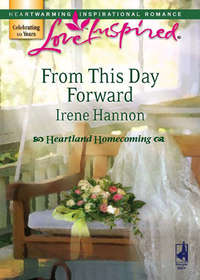
Полная версия
Never Say Goodbye

“Hello, Jess.”
Startled, Jess came to an abrupt stop as the man who had once been the center of her world stepped out of the shadows of a spruce tree. The bag of groceries slipped from her grasp, and only Scott’s quick reflexes kept it from hitting the sidewalk. He moved swiftly toward her and made a successful grab for it, which salvaged the canned goods—but dented her heart. Only inches away, his tangible, physical presence drove the breath from her lungs and she stumbled backward, desperately trying to put distance between them, unable to deal with the sudden, too-close proximity.
She would recognize him anywhere. Yet he was different. And it was more than the physical changes.
IRENE HANNON
has been a writer for as long as she can remember. This prolific author of romance novels for both the inspirational and traditional markets began her career at age ten, when she won a story contest conducted by a national children’s magazine. Today, in addition to penning her heartwarming stories of love and faith, Irene keeps quite busy with her “day job” in corporate communications. In her “spare” time, she enjoys performing in community musical theater productions.
Irene and her husband, Tom—whom she describes as “my own romantic hero”—make their home in St. Louis, Missouri.
Never Say Goodbye
Irene Hannon

www.millsandboon.co.uk
Hope deferred makes the heart sick,
but a wish fulfilled is a tree of life.
—Proverbs 13:12
To my mom and dad, who fill my life with love
and add joy and grace to my days.
Contents
Chapter One
Chapter Two
Chapter Three
Chapter Four
Chapter Five
Chapter Six
Chapter Seven
Chapter Eight
Chapter Nine
Chapter Ten
Chapter Eleven
Chapter Twelve
Epilogue
Letter to Reader
Chapter One
Three years.
Three long, lonely years.
Three years without freedom.
Three years without the woman he loved.
Three years of hell.
And now they were over.
Scott Mitchell turned and took one last look at the bleak gray walls of the high-security prison where he’d spent the past three years of his life.
Where he’d reached such depths of despair that he’d seriously considered suicide. Where he’d spent agonizing hours reliving the tragic accident that had taken the lives of two innocent people.
Where he’d lain awake night after night yearning for the tender touch and sheltering arms of the woman he loved…tormented by the knowledge that she never wanted to see him again.
Where he’d finally found something to cling to in a long-neglected interest in horticulture, a hobby that became a passion and offered a temporary escape from the drab walls to a world of color and beauty and new life.
Where he’d acknowledged his mistakes and straightened out his priorities.
And most important, where he’d slowly, one tentative step at a time, rebuilt his faith and reconnected with his God.
Scott drew a deep, cleansing breath as he stared at the hellish place that, ironically enough, had put him back on the road to heaven. But it had been a harsh, brutal journey. The abrupt transition from power lunches to prisoner, from a world where individual rights reigned supreme to a world where no rights existed had been harrowing. He’d been stripped of his dignity, reduced to a number, looked upon with contempt. He’d lost everything he ever cared about—and that didn’t mean the designer suits or sports cars or country-club membership he’d once valued so highly. No, the loss was much more basic than that—the people he loved and his freedom. Dear God, how he’d missed those two things, which he’d always taken so much for granted!
But never again, he vowed. He was a different man now, with solid priorities and two very clear goals.
First, he intended to make his faith the guiding force in his life.
Second, he intended to win back the heart of the only woman he’d ever loved.
The first would be easy.
The second would take a miracle.
But Scott believed in miracles. He couldn’t have survived these past three years without one.
Yet winning back Jess’s love would take a miracle greater even than survival. He knew that. But with the Lord’s guidance and grace, he believed it was possible. It had to be. Because on a spiritual level, he needed her forgiveness and love to complete his redemption. And on a very basic human level, he simply needed her.
And so he closed his eyes for a moment and prayed silently. Dear Lord, show me the way to prove that I’ve changed, that my remorse is real and that I’m worthy of her love. Please give me the courage to persevere and steady me when I stumble. Don’t let me lose heart if success is elusive. Help me remember that You are with me always, even on my darkest days, and that with You by my side, anything is possible.
And then, with one last look at the forbidding walls, he stepped out of prison and into a new life.
Today was the day.
The man who had killed her daughter was free.
Jess Mitchell drew a long, unsteady breath and involuntarily tightened her grip on the coffee mug. Scott…her husband…the man she had once loved with all her heart…was free. And she hated him, with every fiber of her being. He’d destroyed their marriage and robbed her of the child of her heart, cutting short a life that had barely begun—as well as the life of a respected judge who’d died behind the wheel of the other car. That, too, had been a tragic loss, for he had been a man of principle and honor, a crusader for justice who had earned a reputation for integrity and courage.
As far as Jess was concerned, Scott deserved to rot in prison for the rest of his life.
Her hands suddenly began to shake and she carefully set the mug down, the taste of bitterness sharp on her tongue as she struggled to control a surge of anger—the same anger that had been her constant companion in the months following Elizabeth’s death. Gradually a dull numbness had taken its place, insulating her from pain and allowing her to better cope with the world around her. But now the anger was back, and with it the raw pain.
Reaching out an unsteady hand toward the small glass-topped table in her breakfast nook, Jess shakily lowered herself into a chair. The February day was cold but bright, and a shaft of early-morning sun beamed through the skylight, illuminating the single daffodil in the bud vase in front of her. Gently she reached over and touched the delicate petals, so lovely but so fragile. There was something inspiring about daffodils, she thought with a bittersweet pang. The first harbingers of spring, they bloomed gloriously despite the risk of frost, announcing to those grown weary of the long, dark days of winter that the world would soon be warm and bright again. Perhaps that was why she had chosen this blossom for her table, she reflected. To give her courage to get through this difficult day.
Jess forced herself to take a deep, calming breath, thankful that at least she could once again find pleasure in the beauty of nature. She’d always loved flowers, and she was grateful that her work as public relations manager at the botanical garden gave her a ready supply. But today, even the exquisite beauty of this favorite flower couldn’t dispel her gloom or the inexplicable sense of apprehension that filled her with a restless anxiety.
Jess forced herself to think through her emotions logically, a technique she’d picked up through six months of counseling following the accident. First of all, it was only natural for her feelings of anger and bitterness to bubble to the surface on the day her husband was being released from prison, she reasoned. Knowing that he was now a free man, once more a part of the real world—her world—made it impossible not to think about the trauma and the tragedy he had caused. It was a normal reaction.
But there was no reason to feel apprehensive, she reassured herself. Though they’d had no direct contact since Elizabeth’s funeral, she’d made her feelings very clear to Scott shortly thereafter via a letter from her attorney. As far as she was concerned, no matter the outcome of the legal trial, he was a murderer. And she never wanted to see him again. Period. Those two points had been clearly communicated.
Nevertheless, Scott had written to her. Countless times. She’d returned every letter unopened and unanswered, so he had to know that the strength of her feelings hadn’t diminished. She fervently hoped that he would honor her wishes and stay away.
For a moment Jess considered praying for that outcome, but she quickly dismissed the idea. She’d given up talking to the Lord a long time ago. Why bother? He didn’t listen anyway. In her darkest days her once-solid faith had offered no explanations, no solace for the senseless tragedy that had taken the life of her daughter and turned her world upside down. She was just as bitter toward God as she was toward her husband. Jess had always known that bad things sometimes happened to good people. Had somehow been able to reconcile that with her faith—until it happened to her. Then all the words of comfort she’d once offered to those caught in tragic situations seemed hollow and trite. All she knew was that the loving God she’d always believed in had let her down. Just as her husband had.
Jess pulled herself tiredly to her feet and drained her coffee cup, hoping the caffeine would energize her. She’d slept little last night—but what else was new? Her sleep pattern had been erratic for years. Sometimes, when she was very tired and if she stayed up late enough, she made it through a whole night. Other times she was plagued with nightmares. But worst of all were the times she’d awaken in the middle of the night, overcome with memories of the love she and Scott had shared early in their marriage, when their faith and their devotion to each other were the foundation of their life. On those nights, the loneliness and sense of loss would overwhelm her, filling her with such a hopeless yearning to recapture those early days of intimacy and unity that she’d suddenly discover tears running down her cheeks. And then she’d get up and prowl through the condo, looking for anything to distract her until the first light of day banished the memories of the night to the far corners of her mind.
Jess rinsed her cup, glanced at the bagel she’d planned to eat, and turned away, her stomach churning. Food rarely held much appeal anymore, especially today. Another sign of lingering depression. She knew that from counseling. She also knew there was a reason for her mood this morning. A trigger event. But she’d be okay. She’d get through today, and then she’d go on with the gradual process of rebuilding her life. And in time it would get easier. In time she would even feel normal again. Everyone told her that.
Jess clung to that hope. She had to. Because it was the only thing that helped her get through the endless stream of empty days—and the lonely, memory-filled nights.
“Jess?”
It was one word. Only one word, spoken through a poor connection. But she knew that voice as well as her own. You couldn’t live with a man for eight years without learning the nuances of his every inflection.
Jess’s heart stopped, then slammed into triple time. Her lungs seemed paralyzed, and she struggled to take a breath, fighting a wave of light-headedness. In the two days since Scott’s release, she’d gradually calmed down, convinced herself that he was going to leave her alone.
But she’d been wrong.
Her first impulse was to simply hang up. But if he was still as single-minded and determined as he’d once been, he’d just call again, she realized in panic. Should she talk to him, reiterate that she wanted nothing to do with him? Or should she simply call her lawyer and let him handle the situation?
“Jess? Are you there?”
Softer now, sounding as unsteady as she felt, his voice still had that intimate, husky cadence that had always set her pulse racing. And she didn’t want to hear it. Not now. Not ever. Without uttering a word— unable to utter a word—she simply followed her instinct. She hung up.
Scott heard the soft but very definitive click and slowly let out his breath. It had taken him an hour to work up the courage to call Jess—once he’d found her number. He knew she’d sold the house, because during the past year his letters had been returned marked “no forwarding address.” But he was reasonably certain she’d still be in St. Louis. She’d always been close to her parents, and he was sure she’d relied on them heavily during the traumatic months following the accident and trial. So he’d let his fingers do the walking, and on the third try he had connected with her. But the connection had been purely electronic, he acknowledged with a sigh. And broken very quickly.
Slowly Scott replaced the receiver of the pay phone, then leaned back against the concrete wall of the filling station and allowed his gaze to rise above the run-down buildings around him. His breath billowed in frosty clouds toward the cobalt-blue sky, but even in his inadequate jacket he didn’t feel the cold. His heart was pounding so hard, the blood rushing so quickly through his veins, that he was actually too warm.
Scott had hoped to accomplish several things with his phone call. Test the waters, for one. And Jess’s silent hang-up had given him a definite reading on that: very cold. He’d also wanted to verify her address. That goal, too, had been accomplished. Though she hadn’t said a word, he knew with absolute certainty that he’d reached the right number. He could sense her presence, her energy, coming through the line.
But more than anything, he’d simply wanted to hear the expressive, slightly husky voice that had filled his dreams for three long years. He’d clung to the memory of her bell-like laughter and the sometimes teasing, sometimes tender, sometimes curious and always enthusiastic tone that so clearly reflected her dynamic personality. Today he’d hoped to turn memory into reality. Even one word would have been enough to sustain him temporarily. On that score, however, he’d been less successful.
But he would try again.
And next time it would be in person.
“You seem quiet today, Jess. Everything okay?”
Jess looked at her father, then transferred her gaze to her mother. Though the question had been asked calmly and conversationally, she felt their undertone of worry. They’d seen her through some rough times over the past few years, had stood by her through her deepest despair, almost forcibly taking her to counseling sessions when all she’d wanted to do was huddle in bed under the covers in a dark room. As a result, they had come to learn every nuance of her moods.
While she was deeply grateful for their steadfast caring, it was a bit disconcerting to know that there was little she could hide from them. Certainly nothing as traumatic as Scott’s phone call. She realized now that she should have told them about Scott’s upcoming release two weeks ago, when her attorney had called to alert her. But she had hoped there would be no need to worry them. Had hoped Scott would stay away and not disrupt the delicate balance of her fragile existence. But that hope had been in vain, and now she was faced with the difficult task of telling her parents about Scott’s release—and his call.
Carefully Jess set her fork down and reached for her glass of water, willing her hand not to shake as she took a sip. “I’m fine,” she replied, struggling with limited success to keep her voice steady, “but I was a little upset yesterday. S-Scott called.”
Her mother’s fork clattered to her plate, and her eyes grew wide. Her father looked equally shaken, though his shock quickly gave way to anger as his face grew hard and his mouth settled into a thin, unforgiving line.
“What do you mean, Scott called?” he said, his voice taut with tension.
Jess drew a shaky breath and met his disturbed gaze. “He’s out, Dad. John Kane called a few days ago to tell me that he was being released early for good behavior.”
Jess couldn’t quite make out her father’s muttered comment, but she knew from his tone that it wasn’t pretty. He threw his napkin onto the table and rose to pace agitatedly.
“Good behavior? From a murderer? That’s ridiculous. He deserved every second of his five-year sentence—if not more.”
“Frank, please try not to get upset,” Jess’s mother pleaded, her own face pinched and drawn. “You know this isn’t good for your blood pressure.”
He paused and glared at his wife. “How can you be so calm about this, Clare? This is the man who killed your granddaughter and almost ruined your daughter’s life.”
Clare’s eyes filled with tears and she groped in the pocket of her skirt for a tissue. “I know, Frank. I’m not happy about it, either. But what can we do?”
He began to pace again, and Jess could feel his seething frustration. “We can stop him from calling Jess, for one thing. If he’s bothering her, that’s harassment. We can get a restraining order.”
“Please Dad…Mom…it’s okay. That’s not necessary,” Jess assured them with more calm than she felt. “He only called once. And I didn’t even talk to him. I just hung up.”
That seemed to placate Frank, and after a moment he took his seat again. “Well, that’s good. You did the right thing, sweetie. He ought to get the message. And if he doesn’t, I’ll call John and he’ll take care of it. Okay?”
“Okay, Dad.”
Clare reached over and took Jess’s hand, twin lines of worry furrowing her brow. “Are you sure, honey? Because if you’re scared, we can call John right now.”
Jess stared at her mother. Scared? Of Scott? That thought had never even entered her mind. In fact, it was almost ludicrous. She might hate her husband for what he had done to her daughter and for ruining her life, but he wasn’t a violent man.
“Why would I be scared, Mom?”
Clare’s frown deepened. “Well, it’s been three years, Jess,” she said carefully. “And prison is a hard place, from what I’ve read. It can…do things to a person. Change them. Did he sound angry, or threatening?”
Jess thought back to the few words Scott had spoken on the phone. There had been absolutely no hint of anger or threat in his voice. On the contrary. He’d sounded anxious. And shaky. And…hungry.
Now it was Jess’s turn to frown. Hungry. What an odd word to pop into her mind. And yet it was accurate, she realized. There had been a raw need in his voice when he’d spoken her name. As if he had to hear her voice, to connect with her in some tangible way. It was an oddly disconcerting realization.
“Jess?”
Her mother’s anxious voice brought her back to the present, and she summoned up a reassuring smile. “No, Mom. He didn’t sound angry. He sounded…the same.”
“I can’t believe he called you,” Frank said, a thread of anger still running through his voice. “Why would he do that, when you made it clear you never wanted to see him again?”
“I don’t know, Dad.” Her own voice was suddenly weary.
“Well, let’s forget about it as best we can and enjoy our dinner,” Clare suggested, forcibly lightening her tone as she sent a “let-it-drop-for-now” look to her husband. “Your dad’s right, honey. Hanging up on him was the best thing you could have done. He’s a smart man. He’ll get the message. You’ll probably never hear from him again. Now, how about another biscuit?”
As Jess took the proffered breadbasket, she hoped her mother was right about Scott. But she wasn’t optimistic. She’d heard his voice. And she didn’t think he was going to give up until she talked with him. Which was something she did not want to do.
Maybe a restraining order was in her future after all.
A gust of frigid air whipped past, and Scott turned up the collar of his denim jacket before jamming his hands into the pockets of his jeans. He was chilled to the bone after waiting at the bus stop for thirty minutes, and the inadequate heater on the public conveyance had done little to dispel the numbing cold. The greenhouse looming in front of him promised a haven from the freezing temperatures, and he quickened his pace, breathing a sigh of relief as he stepped into the balmy oasis.
For a moment Scott just stood there, letting the welcome warmth seep through his pores as he scanned the interior. The facility was well maintained, with half of the space devoted to row after row of tagged trays containing tiny seedlings, while larger pots of healthy-looking perennials occupied the other half. Large rubber hoses lay neatly coiled at periodic intervals, and hanging pots were spaced methodically above the seedlings. The operation appeared to be orderly and well run, Scott noted with approval.
“You must be Scott.”
At the sound of the gravelly voice, Scott turned. An older man had entered the greenhouse by a side door and now stood observing him from several yards away. Make that “assessing him,” Scott thought wryly, as the man’s shrewd, slightly narrowed eyes studied him. Scott took the opportunity to look him over, as well. An unlit cigar was clamped between his teeth, and his fists were planted on his hips. His white hair was closely cropped in a no-nonsense style, and his attire—worn jeans that molded comfortably to his lean frame, and an open fleece-lined jacket that revealed a T-shirt containing the words Lawson Landscaping—spoke more to practicality than style. His stance and tone were definitely intimidating enough to scare off most potential job applicants.
But Scott wanted this job. Reverend Young, one of the local clergy who volunteered as a prison chaplain, had warned him when he set up the interview that Seth Lawson was a fair but hard taskmaster. That he expected a lot and cut no slack. But that was okay with Scott. He wasn’t looking for any favors. He just wanted a chance to start over. And as an ex-con himself who had served time for armed robbery many years before, Seth was sometimes willing to give newly released prisoners that chance. Which was more than could be said for a lot of employers. Or people in general. Even though ex-cons had served their time and paid their debt, society was often unwilling to take them back. So the odds were stacked against them.
But Scott didn’t intend to become another statistic. With the help of people like Reverend Young and Seth Lawson, he would make it. He straightened his shoulders and gazed steadily into the older man’s razor-sharp, intensely blue eyes. “That’s right. I’m Scott Mitchell.”
Seth studied Scott for another moment, then nodded toward the rear of the greenhouse. “Office is back there. Let’s talk.”
He led the way to a compact but well-equipped office furnished with three unoccupied desks, several filing cabinets, a fax machine and a copier. Instead of sitting behind one of the desks, however, he continued toward a small conference room at the back, pausing as he passed the coffeemaker.
“Want a cup?”
Scott nodded, trying not to appear too eager. He was still trying to shake the February chill, and coffee would help. “Thanks.”
“Cream?”
“Black.”
Seth poured two cups, then moved into the conference room, shrugged out of his jacket and sat down at the round table. Scott followed suit—but he left his coat on.
“So tell me why you want this job,” Seth said without preamble, chewing on his cigar.
Scott wrapped his hands around the coffee cup, letting the warmth seep into his numb fingers. “I need a job,” he said honestly. “More than that, I need a chance to start over. I know something about horticulture, and I don’t want a job with walls. This sounded perfect.”









